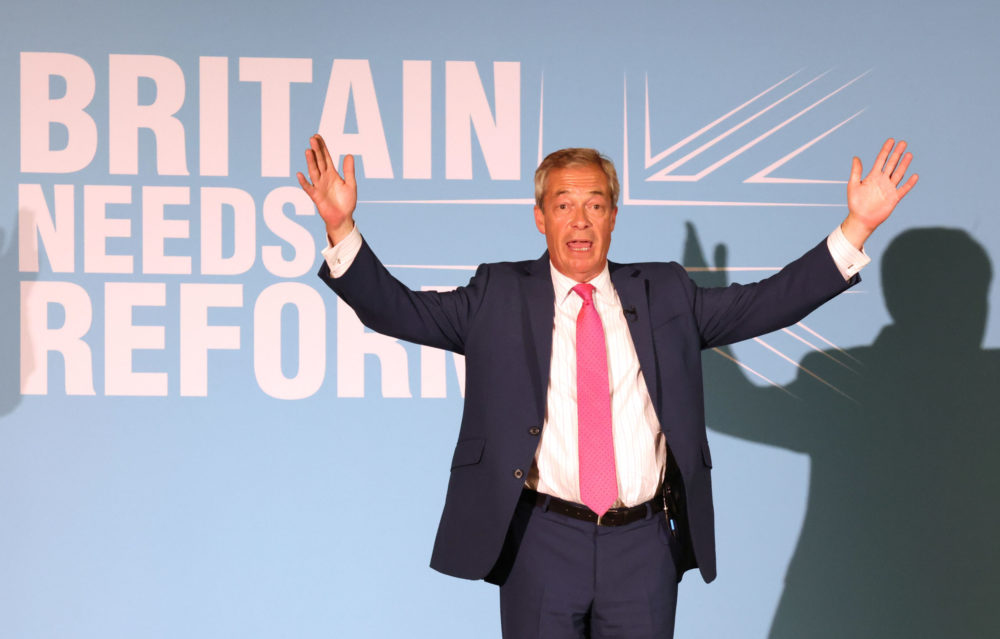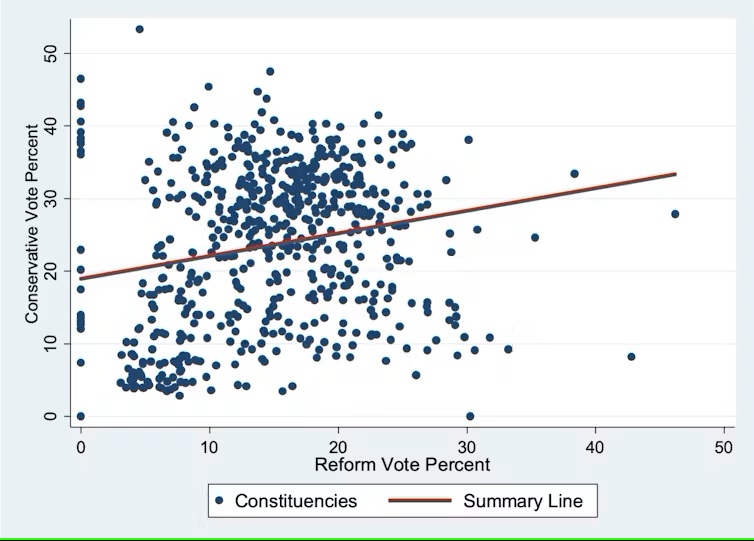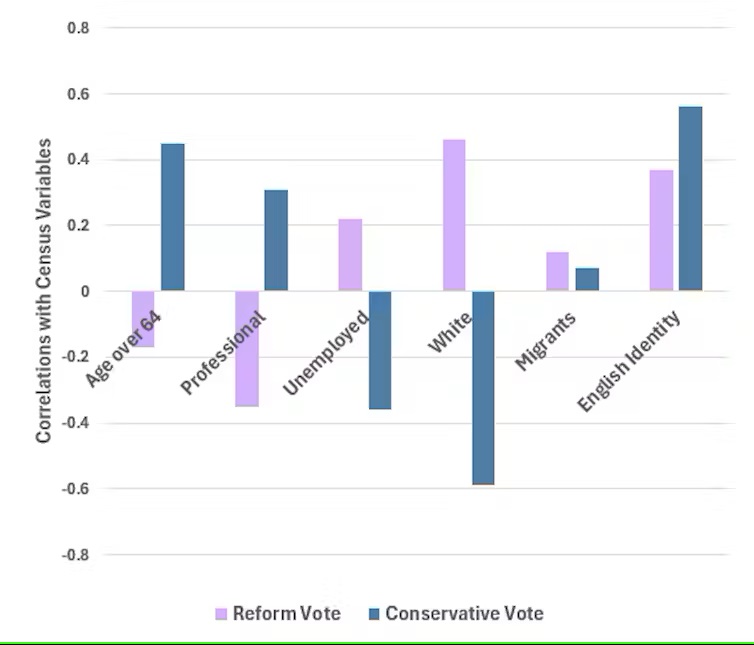Why the Tories may be wasting their time trying to compete with Reform

Paul Whiteley, Professor, Department of Government, University of Essex
The spectre of the Reform party has been haunting the Tories since the general election. There is a general consensus that Reform split the vote on the right of the ideological spectrum, and this significantly contributed to the Tory defeat.
And now that the more centrist candidate James Cleverly has been eliminated from the leadership contest, the party is heading in a rightward direction. Both of the two finalists, Robert Jenrick and Kemi Badenock are on the right of the party and appear to think the next election will hinge on winning votes back from Reform.
But are they right to see Reform as their main threat?
Right-wing vote
The results of the last election are still being analysed but it already looks like our perception of how the right-wing vote played out may be wrong. The perception is that in many constituencies, Reform ate into votes that would have otherwise gone to the Conservatives, costing them parliamentary seats. But that isn’t quite right.
The chart below shows the relationship between the vote shares for the Conservatives and Reform in Britain in the general election, with each dot representing a constituency. The summary line shows that the correlation between the Reform vote and the Conservative vote is positive (+0.21).
This means that the two parties were in effect electoral allies rather than rivals. Their vote shares increased in tandem. To be fair, the correlation is modest, so they were rather weak allies, but who can ask for more than that in this electoral climate?
It’s interesting to contrast this with the relationship between Labour and Conservative voting in the election. Their correlation was strong and negative (-0.54), indicating that they were clearly rivals. When Labour did well, the Conservatives did badly and vice versa. If Reform was a strong rival to the Conservatives, we would see the same pattern.
Rivals or allies? Constituency level votes

Why does the positive correlation show that Reform was an ally of the Conservatives in the election rather than a rival taking votes that would have gone to the Conservatives? The answer lies in the detail. The two parties did well in the same constituencies but appealed to different demographic groups within those constituencies.
If they were campaigning for support in the same group of voters they would be rivals, but for the most part they relied on support from different groups.
Social characteristics
This is illustrated in the chart below which looks at the social characteristics of constituencies using data from the 2021 census. It shows how different groups supported the two parties in the election.
The chart shows the correlations between the size of a particular group and voting for Reform and the Conservatives in the election. It looks at the 575 parliamentary constituencies in England and Wales, since the Scottish data is not yet available.
The relationships between constituency characteristics and voting in 2024

We observe large differences between support for the two parties among the different groups. For example, looking at the percentage of people in constituencies over the age of 64, most of whom were retired, we see a big difference. There is a strong positive correlation between this measure and voting Conservative (0.45), indicating that the Tories did well among older people.
The opposite is true for Reform, since the relationship is negative (although relatively weak at -0.17). Reform did not rely on older people’s support in the same way as the Conservatives.
A similar point can be made about the percentages who worked in professional and higher management occupations. The Tories did well in this group, whereas Reform did badly.
Unemployment
Among constituencies with high levels of unemployment, the reverse was true. A high proportion of unemployed people boosted the Reform vote and undermined the Conservative vote.
If we look at ethnicity, a high proportion of ethnically white people in constituencies helped Reform, but it weakened support for the Conservatives. This seems surprising at first sight until one remembers that many of them voted for Labour, the Liberal Democrats and Greens. The Tories lost a good proportion of the white vote in the election.

The census provided information about the numbers of people who had moved into constituencies from abroad in the previous year. Not surprisingly, given their anti-immigration positioning, large numbers of newly arrived migrants helped both parties, with Reform doing better in these areas than the Conservatives. That said, the correlations were modest and so did not play a large part in explaining the overall results.
National identities
Finally, the 2021 census asked people about their national identities and in this case there was an interesting difference between respondents who claimed they were exclusively “English” rather than ‘British’ or some other identity.
Englishness helped both parties, but it helped the Conservatives more than Reform. It appears that the Tories are more of an English National Party than Reform.
The next general election is a long way off, but these results mean that if the Labour government fails to deliver growth and curb illegal immigration, it will face a pincer movement from the Conservative and Reform.
The Tories will pick up votes in constituencies with a high proportion of prosperous, middle class, retired people and Reform will pick up votes from deprived areas with high levels of young unemployed people.
This article was first published on The Conversation
![]()
Support our Nation today
For the price of a cup of coffee a month you can help us create an independent, not-for-profit, national news service for the people of Wales, by the people of Wales.





They’ll soak up the self-loathing Germanic heritage vote, mainly from the Cons with some from Labour leaving the way open for a strong Plaid-led rainbow coalition.
Rainbow coalitions are dying in Western countries, what makes you think Wales would be different? Note Reform in the new, enlarged Sennedd are predicted to win 17 seats based on the 2024 election results making it the 3rd largest Party, 9 seats behind PC and 4 more than the Conservatives,1 for the LD. Labour on 39. No Green seats. In other words PC would still be 13 seats behind Labour. Not really a PC led Rainbow coalition when really you are talking 2 parties! And I am not sure Labour and PC talk to each other any more. Reform may… Read more »
You’re forgetting that after two years of London Labour ignoring Wales many more will switch from Welsh Labour to the only party standing up for Wales.
Unfortunately the Lib Dems in Wales have zero ambition. Managed decline with a smile seems to be their political objective.
Excellent article.